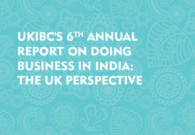Press Release: UKIBC’s Higher Education Report: Futureproofing the UK India Partnership
UK India Business Council have released their latest Higher Education Report titled ‘Higher Education Collaboration: Futureproofing the UK India Partnership’.
New Delhi, November 25, 2019: UKIBC has released their latest Higher Education Report titled ‘Higher Education Collaboration: Futureproofing the UK India Partnership’. The report is the result of a survey of UK universities and business schools and extensive consultation between the UKIBC, Universities UK, and Chartered Association of Business Schools.
As this report shows, UK higher education institutions want to play a role in India’s remarkable rise and are very well-placed to do so, with expertise and experience across the four key tenets of excellence, equal access, expansion, and employability, which the Indian Higher Education ecosystem rightly aspires to.
The appetite among UK universities to engage with India is staggering – nearly 80% of survey respondents put India in their top 5 priority partner markets, and 90% put India in the top 10.
There are a number of reasons for this. Research and knowledge enhancement were the most frequent benefits cited by UK institutions. It was also frequently reported that UK India collaboration widens the research personnel involved, incorporating multiple cultural views, methodologies and ways of thinking. Likewise, student recruitment from India can benefit UK universities by improving the diversity, culture and student experience, which also helps to improve a university’s reputation and global reach.
The UKIBC report clearly identifies the number one issue that would be a game changer for the UK-India higher education relationship – a Mutual Recognition Agreement, which would facilitate student engagement and institutional partnerships, including research partnerships.
Building mutually effective higher education collaboration between the UK and India is one of the most important steps that can be taken by both Governments to future proof the UK-India partnership as it will improve the skills-base, investment and trade flows, and generate more jobs and prosperity in both countries. That is, a Mutual Recognition Agreement would deliver a lot, for both countries.
The UKIBC recommends as a priority five key actions for the Governments of India and the UK to work on to improve higher education in both countries and expand the scope for bilateral collaboration:
1) Mutual Recognition Agreement of foreign qualifications
2) The Government of India should look beyond a university’s overall rankings when setting rules on which international institutions can partner in India
3) Schemes should be introduced to stimulate bilateral collaboration to deliver online learning programmes.
4) The Government of India should make employability skills for graduates a top priority and consider UK models to effectively integrate vocational skills with mainstream education
5) Both Governments should stimulate and support a university-to-university dialogue on university social responsibility
All of these issues will be discussed during a UKIBC delegation of UK universities and higher education institutions to Hyderabad, Delhi and Mumbai during the week of 25 November. The delegates will have a wide range of meetings, including with Governments, Higher Education Institutions and employers.
Speaking in advance of the delegation, the UKIBC’s Kevin McCole said, “There is clearly already a strong India-UK higher education relationship. There were 22,000 new Indian students in the UK this year, up 42% on last year and double the number of 3 years ago. But the relationship is much broader, and we see from our report that UK institutions have a huge appetite to partner with Indian institutions and employers. They, like the UKIBC, are determined to help India achieve its full potential and be a 21st century economic super power”.







